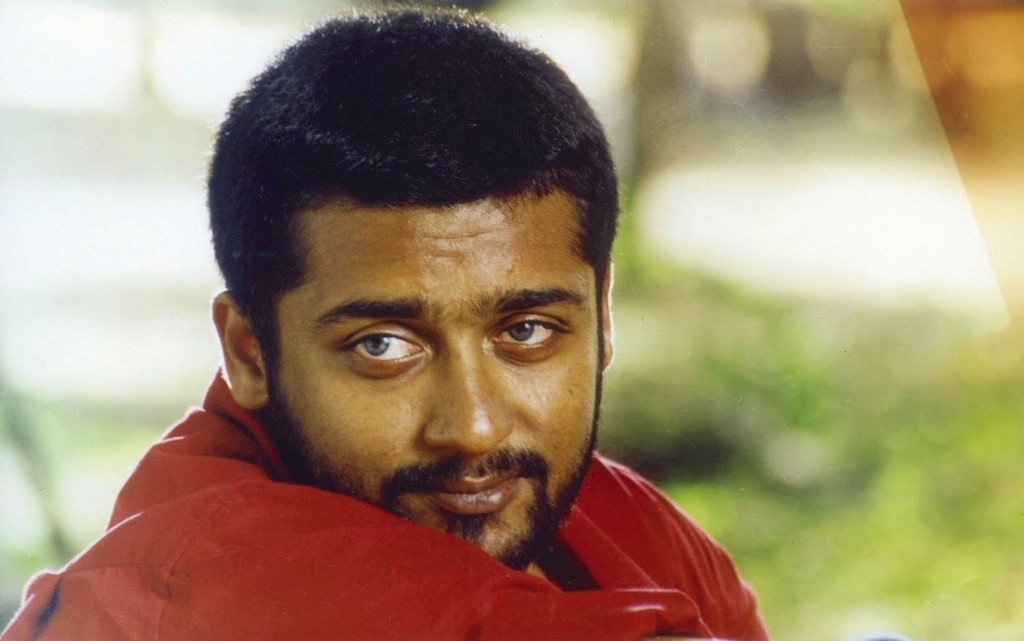With Sethu (1999), director Bala helped Vikram break through the Tamil film industry after years of struggle. Nandhaa, his second film, is a breakthrough film for Suriya. After an indifferent response to both – his films and acting ability till then, the film shows that Suriya could indeed deliver the goods as an actor and what’s more, carry an entire film on his shoulders. The actor hasn’t looked back since.
The film’s plot sees the young Nandhaa kill his adultrous father as he is beating up his deaf-mute mother (Rajshri). He is sent to a reform home/minor jail. Shocked by the killing, his mother refuses to accept him even years later when as an adult, Nandhaa (Suriya) comes out and craves for her love. Nandhaa tries to get his life back on track and gains admission into college. Taking care of the college bully there, he is seen by Periyavar (Raj Kiran), a good-hearted Godfather of sorts. He adopts Nandhaa who works for him. Periyavar helps out a group of Sri Lankan refugees. A young girl from the group, Kalyani (Laila), falls for Nandhaa and slowly he too falls in love with her and their marriage is fixed. Periyavar has a heart attack and his son-in-law, Durai, unhappy with his preference for Nandhaa, kills him in hospital…
Nandhaa’s biggest strength is that Bala by and large sticks to the needs of the story rather than obvious pandering to commercial elements. He shows a firm degree of control over the narrative and keeps the story moving along smoothly. The film is further uplifted by the songs being well integerated into the film’s narrative and being picturised that way as well rather than resort to jing bang choreograhy. Some critics dismissed the film as ‘arty’ but Nandhaa is very much a commercial film but one that shows that some sensibility and logic can be applied within the mainstream film format as well. For instance, the son feeling incomplete without his mother’s love and going to any lengths to get it, is a sentiment commercial Indian cinema has been exploring for years. True, in Nandhaa this does get into extra sentimental territory but manges to work nevertheless, even if one is not happy with its culmination. The relationship between Raj Kiran and Suriya as a foster father-son and the love story between him and Laila too is reasonably well-worked out, having its nice moments. Their romance blossoming is handled rather nicely with the use of the Mun Paniyaa song in the background. In fact, the main characters are well-fleshed out and make you care about what happens to them.
As mentioned, what doesn’t work in Nandhaa for me is the end. True, Nandhaa has craved his mother’s love all his life and missed her feeding him but to accept the food she’s feeding him knowing fully well she’s poisoned him and to die ‘happy’ in her lap doesn’t cut water. Not when he has another life, Kalyani, dependent on him. This is where the film plays up to the worship of the mother figure with the son accepting whatever the mother gives him as nectar even if is poison! Rather than creating an emotional wallop, it ends the otherwise engrossing film on an extremely dissatisfying note. Ultimately, the film follows the stereotype that for a woman, a husband is god no matter what sort of person he is is and she kills her son, who is essentially a good-hearted man and has always tried for her acceptance. But then Bala has been known for his ‘unconventional’ and morbid endings with Sethu as well where the girl kills herself and the boy goes back to a life in the mental asylum. The comedy track with Karunas making his debut, while not as loud as in most Tamil films, could still have been more unobstrusive.
Suriya gives a fine performance in the title role. He shows great intensity and is perfect as the brooding loner yearning for appreciation from his mother. It is a subtle understated performance that has its share of high moments yet is a little raw in places, no doubt. Nevertheless, you see the seeds of Suriya’s histrionic abilities, something the actor has polished to a high level since then.
Of the rest of the cast, Raj Kiran stands out as Nandhaa’s foster father, a godfather of sorts, who thinks with his heart and tries to do what is right even if it isn’t quite legal. Laila as a Sri Lankan refugee looks the part without much make up but tends to be irritating with her hard-on-the-ears voice particularly in the lighter moments. She comes into her own into the more serious portions of the film and is adequate enough then. Rajshri gives a fine performance as Nandhaa’s deaf-mute mother who refuses to accept him and finally feeds him poisoned food.
The technicalities are efficient enough but special mention must be made of Rathnavelu’s cinematography, Suresh Urs’ editing and Yuvan Shankar Raja’s music. In fact, two of the film’s songs – Engengo Kaalgal Sellum and Amma Endralle have been rendered with great feeling by music maestro Ilayaraja, Shankar Raja’s father. What’s more, special mention must be made of their picturisation, particularly the former as we see Nandhaa’s life in the reform home/ minor jail.
A much acclaimed film, Nandhaa would go on to win the Tamil Nadu State Awards for Best Actor (Suriya), Supporting Actor (Raj Kiran) and Cinematography (Rathnavelu). The film also won Filmfare Awards (Tamil) for Rathnavelu and surprisingly for Laila as Best Actress.
Tamil, Drama, Action, Color


